
Summer camp for Ukraine missing children
BBC News in Ukraine

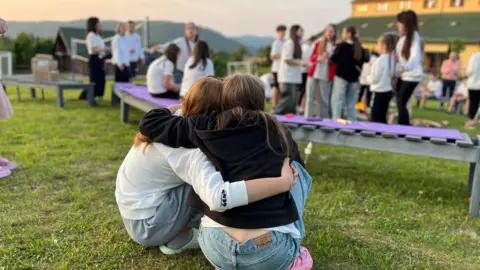 BBC
BBCOn the day Russia’s full-time invasion began, Dima’s father told him that he may never see it again.
“The building on our street was blown away. Baba said, ‘I am going to do whatever I do so that you can live a normal life.’
A few days later, Dima’s father joined the army and went to the next line.
The fifteen -year -old mind is sharing memories with his father’s 49 Ukrainian children. Sitting around the campfire, they place candles in memory of their lost loved ones.
The gentle slopes of the Carpathian mountains of Ukraine, the bright green spruce and the smoothies in its tree, spread at the distance.
This is an amazing background for this heart attack. We are in the relative security of the western Ukraine, the Russian bombs rarely fall here.

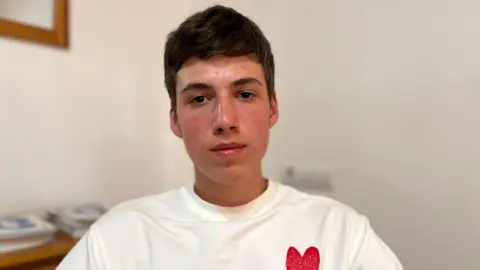
A little girl talks about when the full-bread begins.
She said, “For the first time, we had a bomb blast, my hands were shaking and I was crying,” she says. “It took me a long time to deal with it.”
This campfire activity is a type of group therapy session. This is a leading summer camp for a special group of Ukrainian children, with parents disappearing during the war.
Some were believed to have lost soldiers in action on the next line. Some are prisoned or stuck in occupied areas.
The Ukrainian government says more than 000 people are officially listed as disappearance.
Camp donations, Gen.ukranian, helps thousands of traumatic children in Ukraine and run many summer camps.
But this is the first for this range of children and the BBC was given special admission.
“Most of these children have multiple traumas, because their father not only lost, but some of them lose their uncle and grandmother,” says Vanuya Marterosian, the leading psychologist of the charity.
“They live in frozen states. In the future they cannot plan something because they do not know what to get in the future. And we cannot act like a real damaged kids with them, because they do not have this point of conducting mourning.”
She says many children spend hours in trolling Russian social media channels and looking for information about their family members. The channel often has violent materials related to war.
“They are afraid of crying, they feel that if they start crying, they will remain forever. This kind of trauma is probably the most difficult to work.”
The second day of the campfire meeting I talk to the mind, who wants to tell me more about his father. In November 2023, he heard the last time he disappeared.
“He sent a video of all of them to drink tea in the woods and wrote a message to me,” Everything is fine, I’ll call you tomorrow, “says Dima.
The next day, Dima’s mother had a phone call when his father was lost in action.
“I started calling on his mobile. The father did not answer. That was. I was sitting there and I started crying. I realized that I couldn’t see my father for a while.”

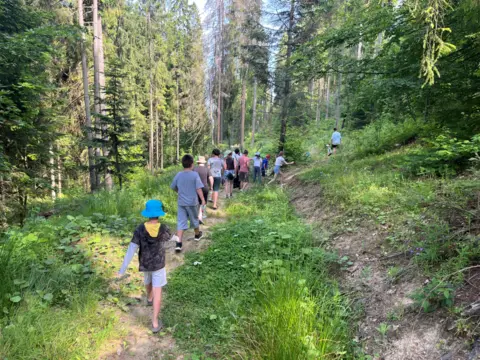
During all our interviews with the children with the children, a gen.ukrainian psychologist was present.
Dima says, “I kept hope that I am the prisoner of war somewhere till the end.
It was only after his mother began to pay attention to the disappearance of her father’s disappearance.
Initially, she was told by the army that her husband was missing after the air attack.
“Then someone else, or the head of the other thing, and said that the Russians shot everyone, and someone saw the body of the father without any legs. Then another soldier in his father’s position said he saw him dead and wounded on his head.”
Dima says that his mother and his mother had an impact.
“For that reason, the mother shouted a lot. She supported her,” Dima says. “When the father left, he said,” Dema, whatever happens, you should take care of the mother because you are a man and you are her son. ” “
Group therapy in the camp is organized daily in small rooms. We have permission to monitor the start of one of the sessions – the rest is confidential.
A psychologist, Olena, shows the color chart for children, used to describe emotions. Green is happy, blue is sad, yellow is anxious or extremist and there is red anger.
Today, they will talk sadly. Olena says, the more unpleasant and sad we feel, the more we love the people we are. It shows that these people are important to us.

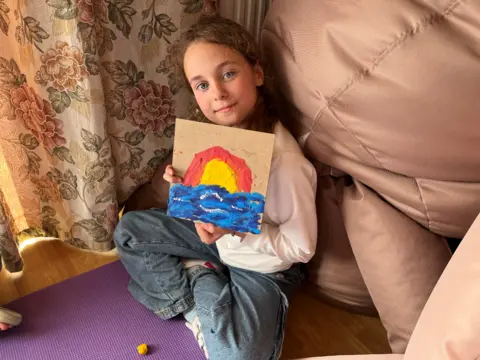
Children are encouraged to express their feelings with art. In the art therapy session, many paintings show happy families, homes and pets.
A seven -year -old boy Zara, tells me that his painting is called “Daddy Comes Home”. It shows the yellow stick men in front of the blue sky – the color of the Ukrainian flag.
Most children live in cities coming to the cities coming to the nearby bombings of Russian drones and missiles. In the northeast of Ukraine, the native village of Kharkiv, 16, of the 16 -year -old, near the frontline.
“If there is a nearby bombing, I go to the corridor and take shelter. I worry and stress a lot,” says Nastia.
Her father was also a soldier. He disappeared on the frontline about a year ago. Seeing her finally two weeks before he disappeared.
I ask her that her father’s memories and her eyes are shining.
“He was very kind, he spoiled me very much. He had a sweet teeth like me, and I always knew what I had to buy,” says Nastia. “I remember only good things about the father. I remember she disappeared.
“I love him so much and I know he loves me too,” she continued, “I hope we can make new memories with him again.”
This camp also gives children the opportunity to get a chance to get sleep, intact by air -ride siren – and only gives fun and playing opportunities. Swimming pools, volleyball rentals and sports are regular trips.
“It is important to move the body to heal the trauma,” head psychologist Vanui explains.

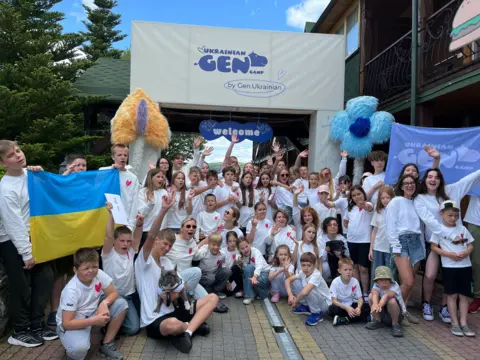
At the end of the camp, it is time for children and employees to take a message.
A boy named Ilia is in the flood of tears – he does not want to go home.
“We have such a child in every camp,” General.
She pointed to the crowd of children playing in the garden.
“Perhaps for the first time in their lives, they found people who have gone through the same experience. And that is very important. Group therapy is more important than anything – to see that you are not alone with pain.”
Oksana says that the work of her dancing is overwhelming.
“Millions of Ukrainian children have been hurt by war. This is a humanitarian disaster.”
Additional reports of John Murphy
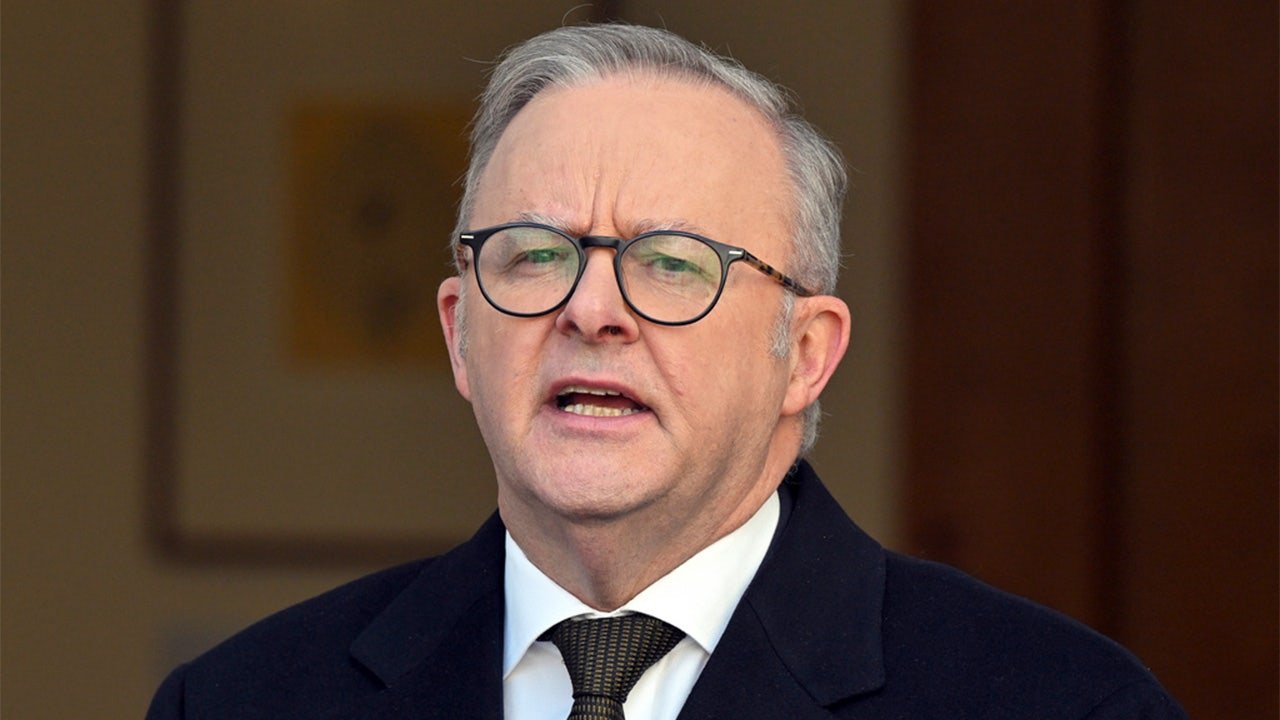



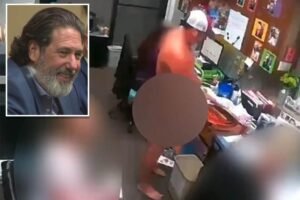
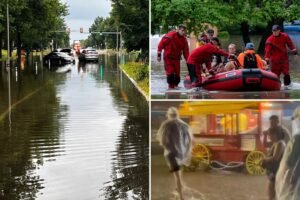
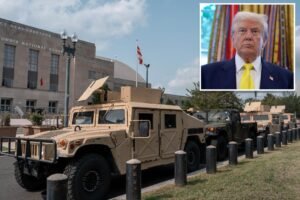

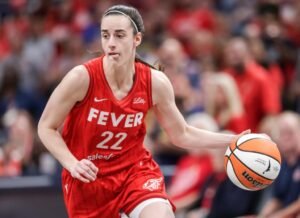


Post Comment